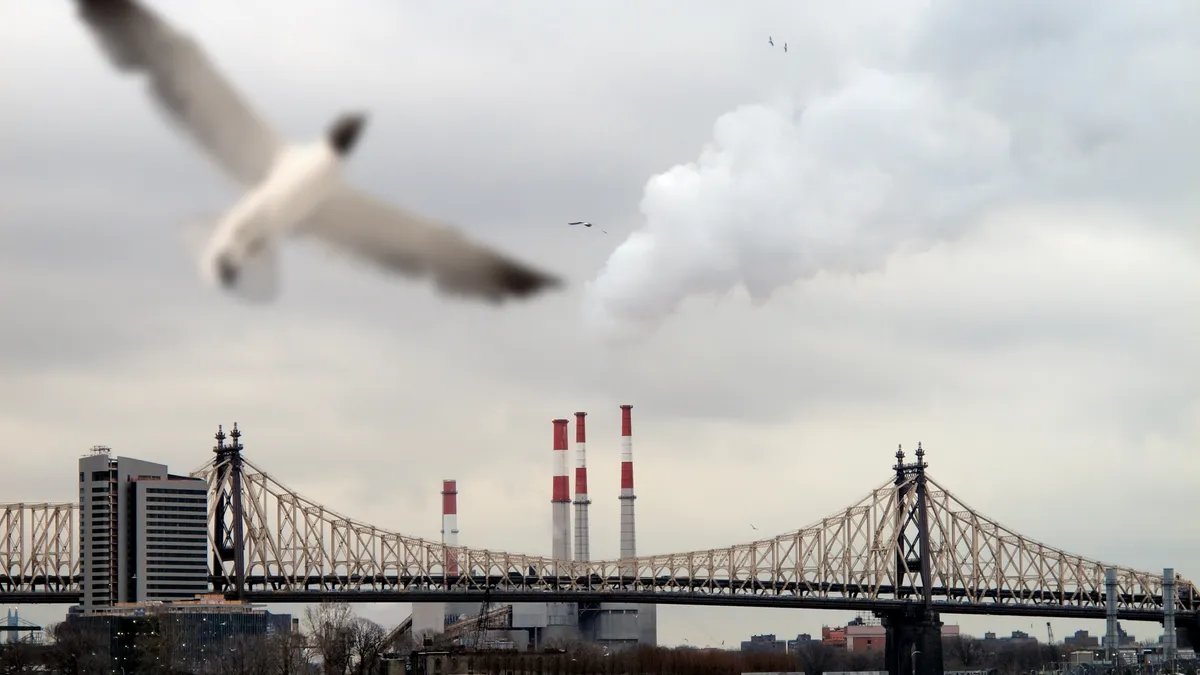Dive Brief:
- New York Gov. Kathy Hochul, D, announced a cap-and-invest program Tuesday that would set declining limits on greenhouse gas emissions from 1990 levels and is expected to raise more than $1 billion in revenue annually.
- She directed the Department of Environmental Conservation and New York State Energy Research and Development Authority to advance the program, which would invest in initiatives that drive emissions reductions equitably by giving priority to disadvantaged communities, limit costs to economically vulnerable households, and maintain business competitiveness.
- An environmental advocate said Hochul’s program could eventually partner with other Northeastern states and Quebec.
Dive Insight:
Hochul’s cap-and-invest program would limit greenhouse gas emissions and share revenue with New Yorkers from disadvantaged communities to help cover utility bills, transportation costs and decarbonization. Hochul also will propose legislation to create a universal Climate Action Rebate to direct the expected $1 billion in annual cap-and-invest proceeds.
The program is expected to help New York meet the requirements of the 2019 Climate Leadership and Community Protection Act of cutting greenhouse gas emissions 40% by 2030 and at least 85% by 2050, both below 1990 levels.
Large-scale greenhouse gas emitters and distributors of heating and transportation fuels will be required to purchase allowances for emissions. The state says the cap-and-invest program will incentivize consumers, businesses and others to transition to lower-carbon alternatives.
Richard Schrader, New York legislative and policy director for the Natural Resources Defense Council, said Hochul’s cap-and-invest program will take years to put in place. “No one is going to say it will be done with the flip of a switch,” he said Thursday in an interview.
The cap-and-invest program could be more successful than the Regional Greenhouse Gas Initiative because of its emphasis on equity and racial justice and ambitious emissions reduction targets, Schrader said.
New Yorkers for Affordable Energy, a coalition of energy businesses and trade unions, has previously criticized state policy it says has failed to fulfill “ambitious climate goals while protecting consumers from blackouts and rising energy costs.” The group did not immediately respond to an email seeking comment on the cap-and-invest program.
Hochul’s 2023 legislative priorities, unveiled in her Jan. 10 State of the State address, also propose $200 million in electric bill credits to about 800,000 households with incomes of less than $75,000. Financial support would be paired with efforts to help 20,000 low-income families improve energy efficiency with insulation, appliances and moving to electric heating from fossil fuels.
The pilot program would ensure participating families do not pay more than 6% of their income on electricity, Hochul said.
The governor also is calling for zero-emission new construction, with no on-site fossil fuel combustion by 2025 for smaller buildings, and by 2028 for larger buildings.
She is proposing New York prohibit the sale of fossil fuel heating equipment by 2030 for smaller buildings and 2035 for larger buildings and related fossil fuel systems for all buildings. Hochul also backs assigning letter grades to larger buildings based on their energy use. The state says such a system would help building managers make informed choices to cut electricity bills and emissions.
Hochul is also directing the Department of Public Service to identify and remove barriers to deploying charging infrastructure for medium- and heavy-duty vehicles.















